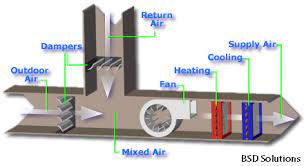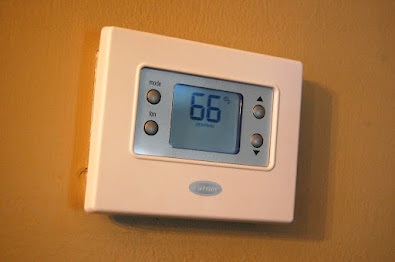How does an economizer reduce HVAC operating costs
An economizer is an air conditioner that uses heat exchanger coils to cool, then reheat, recirculated indoor air instead of cooling outdoor air.
Photo Credit: https://svach.lbl.gov/what-is-an-economizer/
Economizers are appliances that can save you money by reducing heat or cooling costs. For example, they turn off the new room air conditioning when you are asleep.
Economizers are mainly used in small spaces, such as apartments or offices, where space constraints limit the ability to install ductwork. However, they are also used in commercial buildings with tight spaces.
Economizers aren't ideal for central heating and cooling systems because they don't provide as much control over temperature settings. However, they offer several advantages and savings over standard furnaces and air conditioning units.
There are two types of economizers. The evaporative cooler's coldest economizer uses water spray to cool air. The warmest economizer, or direct expansion refrigerant system, employs cold liquid refrigerant inside tubes to cool air passing through the tubes—the difference between these two types of economizers is the method of transferring heat.
In the case of the coldest economizer, air passes over wetted surfaces and absorbs moisture to cool air. As a result, heat is transferred from the air to the surface and re-released into the air, thus cooling the air. In contrast, the warmest economizers transfer heat directly from the air to the refrigerant, reducing the heat required to cool air.
In addition to using water spray or refrigerant to cool air, economizing provides another advantage: reduced humidity levels in the conditioned space. A humidifier installed near an economizer's coil helps prevent condensation from dripping down walls and furniture. This benefit alone makes economizing worthwhile for most homeowners.
Why is it beneficial?
The primary purpose of an economizer is to save money -- typically about 10% to 15%. That means you're still saving money after adjusting for the additional costs associated with installing an economizer (such as buying a more extensive unit).
Photo Credit: https://mechanicalboost.com/economizer/
With some modern furnaces and air conditioning systems, it is possible to buy them without an economizer. However, this option comes at a price. For example, the efficiency of a furnace or air conditioning system with no economizer would be significantly worse than one with an economizer. Nevertheless, on average, furnaces and air conditioners with economizers have higher efficiencies than those without.
When you use an economizer, you can run the furnace or air conditioner longer before needing service. An extended period of operation reduces the need to call a maintenance specialist, saving you money.
A properly-installed economy heater is less likely to cause damage to insulation around pipes and ducts. In addition, it often sits quietly and unobtrusively, so you won't notice any problems until there's a problem.
Although economizers may not be necessary for every home, they're worth considering. If you want to lower your utility bills and enjoy better indoor air quality, consider adding an economizer to your HVAC system.





Comments
Post a Comment